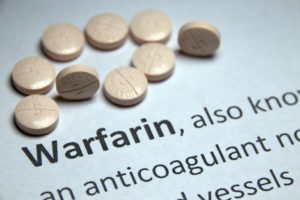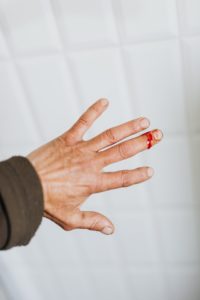Warfarin and its uses
 Warfarin is an anticoagulant medication that is used to treat or prevent blood clots. Warfarin works by inhibiting the function of vitamin K in the clotting process. Warfarin is used to treat a variety of illnesses, including atrial fibrillation (a heart rhythm abnormality), deep vein thrombosis (blood clotting in venous blood vessels), and heart valve replacement.
Warfarin is an anticoagulant medication that is used to treat or prevent blood clots. Warfarin works by inhibiting the function of vitamin K in the clotting process. Warfarin is used to treat a variety of illnesses, including atrial fibrillation (a heart rhythm abnormality), deep vein thrombosis (blood clotting in venous blood vessels), and heart valve replacement.
Warfarin should be administered once a day. The dose of warfarin is normally established by the doctor depending on the patient’s clinical condition and the readings of the International Normalised Ratio (INR). This INR reading indicates the ability of a patient’s blood to coagulate. The patient is at risk of bleeding or clotting if the INR value does not fall within the target range. The INR target to be achieved is determined by the type of disease and the patient’s risk of bleeding.
Warfarin interaction
Drug interactions occur when a drug reacts with another substance taken at the same time and can alter the desired effect of the drug. There can be interactions between medications and foods, beverages, supplements, and other medications. Warfarin is a medicine that interacts with lots of different substances.
Vitamin K, whether taken as a supplement or derived from food or drink, is a prominent example of a drug interaction with warfarin. A high vitamin K level can impair the effectiveness of warfarin. In addition, there are a number of additional medications and traditional products that can reduce warfarin’s effectiveness. For example, warfarin could interact with other anticoagulant medicines (such as dabigatran) and antiplatelet drugs (such as aspirin). Interaction with these medicines will increase the effect of warfarin and if not monitored closely, may increase the risk of bleeding.
Certain medications possess a blood-thinning effect, and the risk of bleeding increases if they are taken with warfarin. This situation could occur even if the patient’s INR remains within normal limits. Pain relievers from the non-steroidal anti-inflammatory drugs (NSAID) class (e.g., diclofenac, ibuprofen, and naproxen) and antipsychotic drugs from the selective serotonin reuptake inhibitor (SSRI) group (e.g., sertraline) are examples of these drugs.
Additionally, antimicrobials can interact with warfarin. Some antibiotics can interfere with the formation of vitamin K in the intestines, reducing the effectiveness of warfarin. Other antibiotics, on the other hand, impede warfarin metabolism and increase warfarin concentrations in the body.
Advice for patients
 When taking warfarin, the patient must limit their vegetable intake to no more than one serving per day. Food intake high in vitamin K should be done consistently every day to help control INR readings. Spinach, broccoli, kale, leaf salad, chives, and green mustard are examples of vegetables rich in vitamin K. Plus, foods containing high quantities of vitamin K include beans, soy products, and beef liver.
When taking warfarin, the patient must limit their vegetable intake to no more than one serving per day. Food intake high in vitamin K should be done consistently every day to help control INR readings. Spinach, broccoli, kale, leaf salad, chives, and green mustard are examples of vegetables rich in vitamin K. Plus, foods containing high quantities of vitamin K include beans, soy products, and beef liver.
Patients should also consult their doctor or pharmacist before taking any medications, including herbal and traditional products. Alcohol consumption should be avoided or limited as well. Additionally, the patient must adhere to the prescribed treatment and attend the scheduled appointment. The pharmacist will provide necessary counselling to the patient if required.
Patients should be more alert for symptoms of bleeding and blood clots. Bruising on the body or sudden nasal bleeding, black or blood-containing stools, and minor bleeding that persists for more than 10 minutes are examples of symptoms of bleeding. Shortness of breath, chest pain, swelling, and pain in one leg are all signs that a patient needs further medical examination promptly because unidentified blood clots are most likely to be the cause of these symptoms.
If there are signs of bleeding or blood clotting, the patient should seek immediate medical attention at a nearby healthcare facility. Even if the symptoms are not severe, avoid delaying until the next scheduled appointment.
If there are any inquiries regarding this medicine, please call the National Pharmacy Call Centre (NPCC) at the toll-free number 1-800-88-6722 during weekdays from 8 a.m. to 5 p.m., except on public holidays.
REFERENCES
- Buku Rawatan Antikoagulasi (Warfarin), KKM.
- Website National Pharmaceutical Regulatory Agency (NPRA) – Quest 3.
- Portal MyHealth KKM
- www.ncbi.nlm.nih.gov
- https://www.drugs.com/warfarin.html
- https://www.contemporaryclinic.com/view/antibiotic-and-anticoagulation-watching-warfarin-levels
Prepared by:
Mohd Shahiri bin Abd Ghapar
Pharmacist
Pharmacy Practice and Development Division
Ministry of Health
